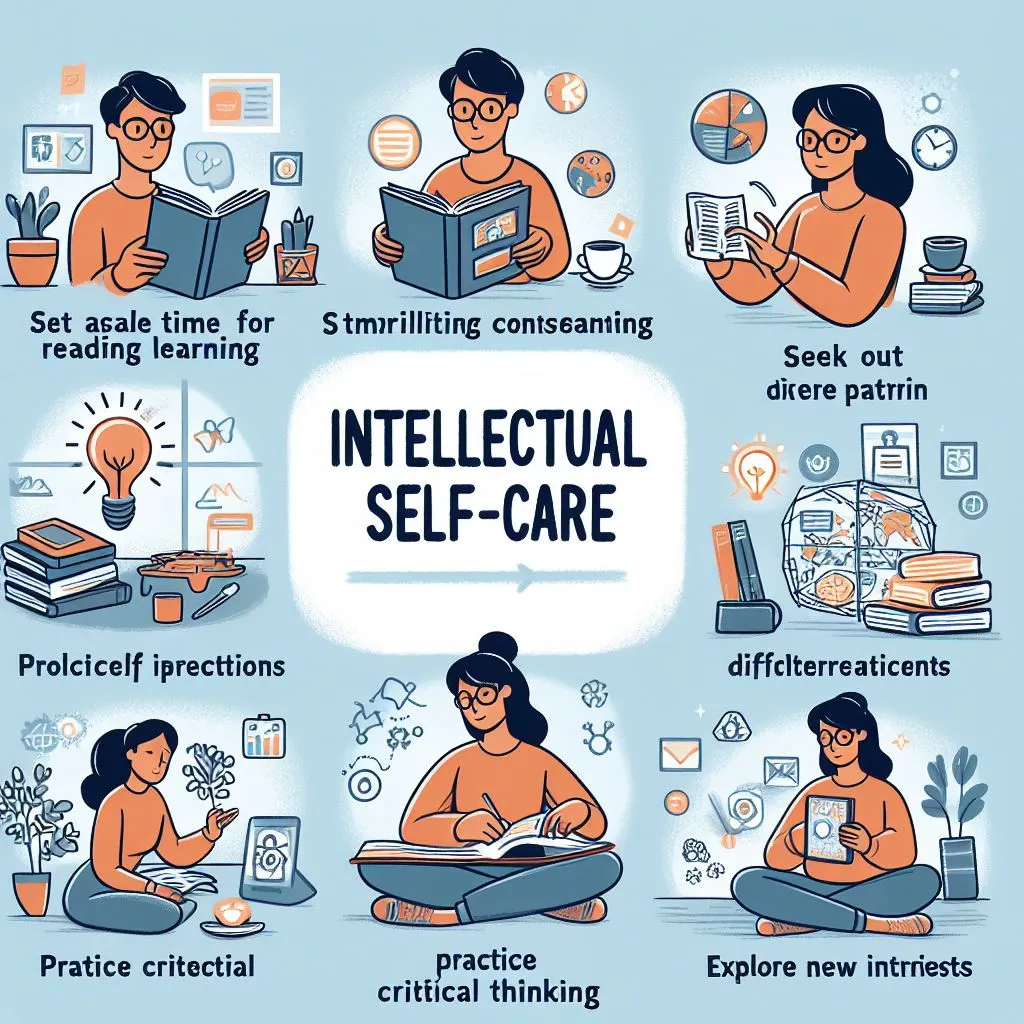According to the University of Cambridge, the intellectual self is your identity in the sense that you are a continuous learner and thinker. for example, like me, you find ways to learn from everything like books, real-life stories, and social or political narratives and think about it. but how do we improve? simple ways, fact-checking information, listen to your opposite perspective.
So, what exactly is intellectual self-care? why is important and how to practice, These questions lead us to the realm of Intellectual Self-Defense, a topic supported by Noam Chomsky, where the importance of nurturing our intellectual abilities and critical thinking skills is emphasized in navigating the vast ocean of information.
What is the Intellectual Self?
Before discussing intellectual self-care practices, it is important to understand what is meant by the “intellectual self.”
The intellectual self refers to a person’s identity as a thinking being and continuous learner. It involves traits like curiosity, critical thinking skills, interest in abstract ideas, and desire for knowledge.
Researchers at the University of Cambridge define the intellectual self as “one’s developed intelligence and the facets of personality that relate to cognitive ability and learning.”It represents the part of us that seeks to understand complex issues, evaluate information objectively, and further develop our thinking through education.
What are examples of the intellectual self?
Some key examples that represent an active intellectual self include:
- Having interests in philosophy, science, art, and history that provide mental stimulation
- Regularly reading books and publications beyond surface-level knowledge
- Critically analyzing social/political issues instead of accepting surface conclusions
- Enjoying debates and discussions that challenge preconceived views
- Pursuing lifelong learning through activities like online courses, travel, hobbies
- Taking measured opinions on nuanced topics after considering multiple viewpoints
- Admitting when one’s knowledge is limited and opinions could benefit from a reevaluation
How to Improve Your Intellectual Self
Some ways to strengthen your intellectual self include
- fact-checking information,
- considering opposing views
- admitting what you don’t know
- continuously learning new skills
- challenging biases
What is Intellectual Self-Care?
Intellectual self-care refers to activities focused on continuously learning, challenging one’s perspectives, and nourishing critical thinking skills. It involves engaging the mind in new ideas and information. Some key aspects of intellectual self-care include:
- Reading diverse materials outside one’s normal interests
- Taking online courses on new subjects
- Learning a new skill or hobby that requires problem-solving
- Having thoughtful discussions with others who have varying views
- Fact-checking information instead of accepting everything at face value
- Reflecting on one’s beliefs and prejudices without defensiveness
Why is Intellectual Self-Care Important?
Intellectual self-care is crucial for several reasons:
It Keeps the Mind Active
Just as exercising the body maintains physical strength, intellectual pursuits help keep the mind agile and ward off mental decline.[1] Regular learning prevents cognitive rigidity that can come with age.
It Leads to Personal Growth
Challenging oneself with continued education fosters development of new perspectives and understanding of complex issues.[2] This results in more empathetic worldviews over time.
It Strengthens Critical Thinking
Evaluating diverse facts and opinions improves skills like identifying bias, weighing evidence objectively, and detecting logical fallacies.[3] Strong critical thinking benefits all areas of life.
It Promotes Well-Being
Mental stimulation releases dopamine and endorphins in the brain, improving mood.[4] Feeling intellectually engaged is linked to greater life satisfaction and sense of purpose.
How To Practice Intellectual Self-Care?
Some easy intellectual self-care practices include:
- Read books/articles on varied topics such as biographies, history, and science each week.
- Take free online courses from platforms like Coursera, edX, and OpenCulture on subjects outside your field.
- Learn a new language using apps or books at a pace of 15-30 minutes daily.
- Discuss current issues respectfully with others to gain multiple viewpoints.
- Try puzzles/games such as crosswords, sudoku, and chess to challenge problem-solving skills.
- Reflect on beliefs through journaling about how perspectives have changed over time.
What Are The Contributions Of Noam Chomsky On The Intellectual Self-Defense?
Linguist Noam Chomsky advocated for “intellectual self-defense” to protect against propaganda and manipulation. This involves rigorously questioning mainstream narratives, thinking independently, and seeking out banned or marginalized ideas to develop informed opinions free of bias. Regular intellectual self-care and defense keep our minds engaged, growing, and resilient.




Is it possible to truly develop our intellectual selves without facing discomfort, challenging our beliefs, and engaging with perspectives that are radically different from our own?”,
“refusal
No, avoiding discomfort and different perspectives limits growth. Real intellectual development comes from challenging yourself. Refusing that keeps you stuck.